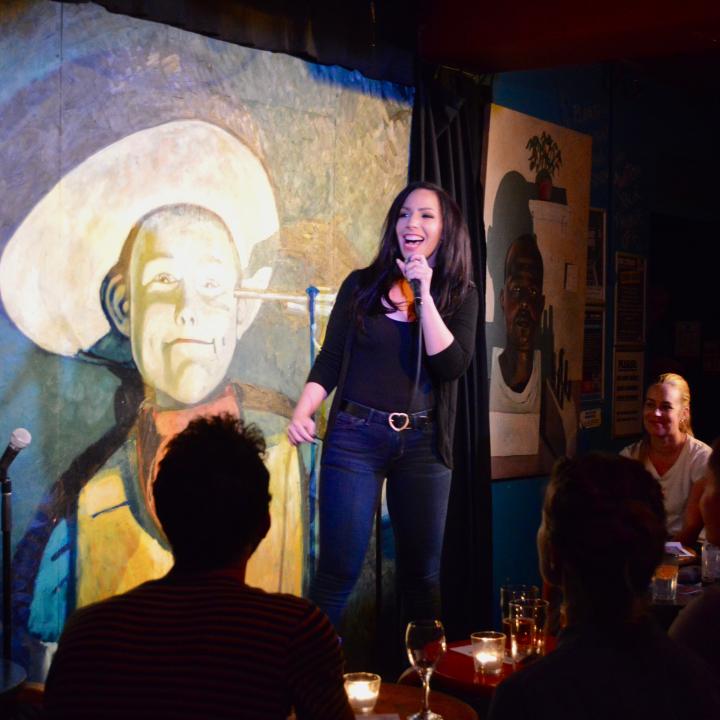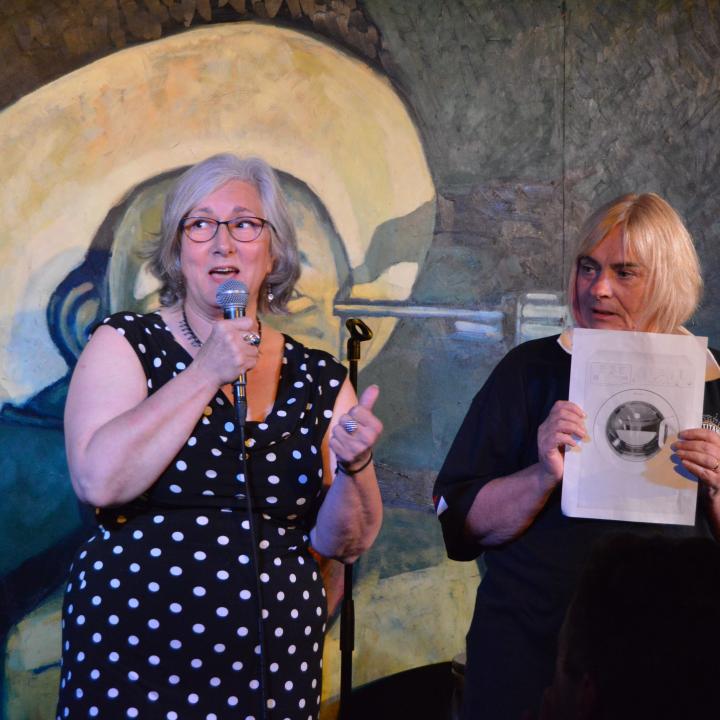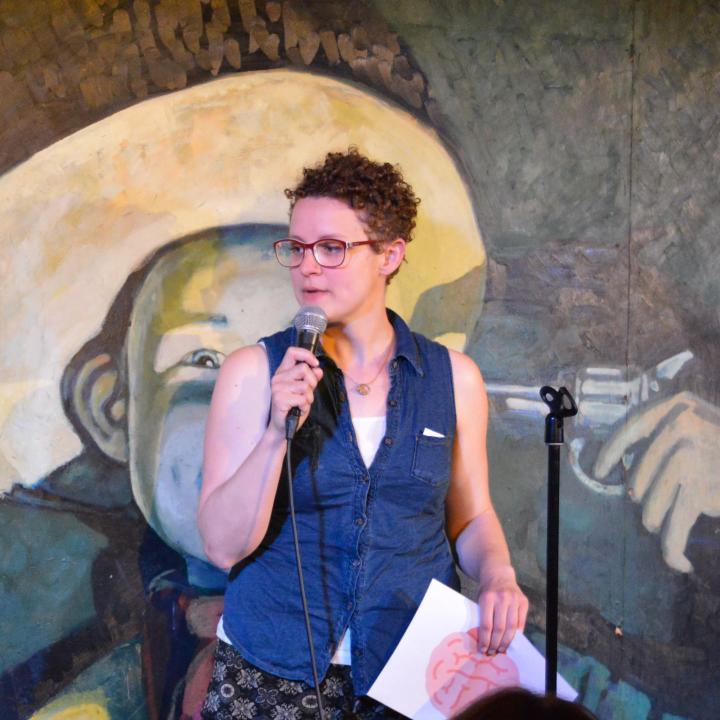A Night at the Cabaret... of Dangerous Ideas (CoDI)
Combining a mixing pot of intellectual spoils with a chance for unbridled audience participation and a large dose of outlandish entertainment, this year’s Cabaret of Dangerous Ideas (CoDI) will provide many exciting evenings at The Strand’s New Town Theatre. Across a large array of performances, CoDI provides a setting for hidden and controversial research to be discussed and debated in a very different format to a typical lecture – and the opportunity to present this research to more eclectic audiences. Many of CoDI’s performers come from the large pool of intellectual talent notable at the University, as well as from other organisations and universities across the City. Following their role in the July Previews, we spoke to three University academics about their research and experience of the events.
Amy Andrada is a research student within the School of Social and Political Science, with her work focussing on the development of self based on gender, femininity and motherhood. Her show - 'Are Women Assholes?' - is on the 8th of August at 8.10pm.

Your CoDI show questions the constant societal presumptions and expectations that are placed upon women, often by women themselves. Where does your show sit amongst current feminist debates?
The show actually takes a classical feminist argument and presents it to women as they know, contend, and may already support via concerns with impossible aesthetic expectations, partnership desires, and motherhood dilemmas. In fact, the show aims to remove identity politics by getting to the heart of common personal issues among women. Where the show pivots is by focusing on how women perpetuate impossible expectations upon each other by discussing how undermining this is to their own happiness and to the collective force of women as a whole.
It’s really about being frankly honest with ourselves and each other. And we, as women, are already bad ass, just as we are. Supporting this is possible, but taking a look in our own mirrors (pun not intended) is vital to understanding and accepting that, especially if we want to continue moving forward as a group.
How far does your show rely on audience participation and what can audiences expect?
The show is a slight mix of audience involvement and guided queries. It’s co-constructed and completely cooperative. In fact, the answers offered by audience members help construct the show, so their answers frame the ideas we eventually put together to create a larger picture. And I only ask questions audiences already know the answers to (or at least they think they do...)
Just expect to have fun. Nothing discussed is unfamiliar, but afterwards audiences may reconsider some previously held ideas. And as an educator, that’s the most I can hope for.
How important is it for academic research to take advantage of settings such as the Festival Fringe?
As an academic and an educator, I think public lectures and knowledge exchange is vital for the relationship between the community and academia. Our research is for the public good and the community should know it’s accessible, but researchers should make more efforts to make those connections in both tangible and engaging ways. Platforms like the Fringe Festival (and CoDI) help facilitate these connections and it’s a relationship that strengthens both groups. It shows academic research is relatable, useful, and necessary while ensuring academics learn their audiences and their community, many of whom are conducting research for the benefit of their communities.
It really is a beautiful thing, and I wish more academics took advantage of opportunities to engage with the public, after all, our work is ultimately for them.
Rayya Ghul works within the University’s Institute for Academic Development and lectures in University Learning and Teaching. Her show - 'Are you a Problem Addict?' - is on the 19th of August at 8.10pm.

Your CoDI show is titled ‘Are you a problem addict?’ and promises to provide solutions to people’s daily obsession with problems, solutions and irritations. What is the central debate behind your discussion and why do you think this topic is such a controversial one?
My dangerous idea is that talking about your problems can be bad for you. It’s controversial because we’re always told that talking about one’s problems is good for you. Of course, this is a provocative way to introduce my show and I’m not suggesting that you shouldn’t talk about things which are causing you difficulty, distress or stress. Instead, I show how the way you talk about issues can be toxic. I’m a solution focused practitioner and when I started working with mental health clients in my previous career as mental health occupational therapist in a community mental health team I gradually realised that it was a radically different way to have conversations.
Most traditional talking therapies adopt a problem-solving approach in one form or other. This requires a process which seeks to unpick what’s wrong or what’s gone wrong or is deficient - and fixing it. In my show, I demonstrate how using a problem-solving approach to things that aren’t strictly problems can cause low-self-esteem, frustration, helplessness and hopelessness and damage relationships. I also introduce the basic ideas of solution focus and how solution focused conversations can restore hope, reactivate motivation and best of all – make you feel good about yourself.
Across your work as a solution focused therapist and life coach, as well as an academic, you say that you are passionate about people’s potential for transformation and positive change. Do you feel that the CoDI events benefit this passion?
Oh definitely! Since I stopped working in statutory mental health services 20 years ago, I’ve continued to find ways to introduce solution focus into everyday life. I felt strongly that one shouldn’t need to visit a therapist to benefit from solution focus so the first thing I did was write a self-help book, The Power of the Next Small Step, which my show is based on. It’s because of working with people in a solution focused way and researching the outcomes that I’ve become absolutely convinced that if you give people the right tools and get out of their way, allowing them to be experts in their lives, they are brilliant at coming up with solutions that really make a difference. The CoDI show gives me another way to communicate these ideas and provide a counter-narrative to all the messages people get that they aren’t good enough and that in order to make things different they first have to change.
I think all the CoDI shows have this potential because they give people a different perspective on familiar issues or introduce them to new ideas. I know my own perspectives have changed just by watching the preview shows. Although we all like things to be familiar, humans also have a real desire for change for the better, which is why we are continuously researching, designing and creating. CoDI allows everyone to be engaged in thinking together about ourselves and our futures.
How did your experience of the CoDI events at Previews compare to an everyday lecture?
As a performer, it was a totally different experience to giving a lecture – it’s disorienting (and at times terrifying!) not being able to see your audience and gauge their interest. But it was also great to have to think of new and entertaining ways to get my ideas across. I was afraid people were bored, but afterwards I got plenty of positive comments to make me feel more confident and I’m really looking forward to my main show now.
As a member of the audience, watching the other shows was fantastic. In a lecture, there’s some assumption that students have at least some prior knowledge, but in the shows, the performers were communicating in a way that was engaging and thought-provoking. I wouldn’t say it was dumbed down, because I didn’t feel like I was being spoken down to. Instead, I felt I was getting an insight into the person’s research area and why it was important. It’s ‘live’ so there’s an edgy feel – in a lecture, the lecturer controls the room. In a show, the performer needs to engage the audience, so it’s a different dynamic.
Rebekka Puderbaugh is a Teaching Fellow in Phonetics and Laboratory Phonology within the School of Philosophy, Psychology and Language Sciences. Her show - 'Don't Believe Your Ears!' - is on the 23rd of August at 1.30pm.

Your CoDI show explores how people can hear different things in the same sounds. In a format that encourages audience interaction, how does your show put this to the test (without giving too much away!)?
Most people are familiar with optical illusions, but auditory illusions are much more mysterious. This is probably partly because unlike images, sounds have been difficult to capture and reproduce until relatively recently. Before we all had portable recording devices in our pockets, sounds were mostly transient and impossible to share or reproduce precisely. In my show, I share some sounds that have become viral internet sensations in recent years because of the very different things people hear in them. We also listen to sounds that have been specifically designed to be ambiguous, or show that hearing is perhaps more about your brain than your ears. It's amazing to watch a room full of people all listening to precisely the same sound, having very different experiences of it, and being in a situation where they can compare their experiences to those of other people.
In your recent preview, were there any heated debates amongst the audience?
There were no heated debates, but there were a lot of astonished faces! I'm hoping in the longer format of the full show there will be more time for discussion.
What benefits do you feel the format of CoDI events bring to academic research?
My favorite part of academic life is teaching; sharing ideas and learning from people with different perspectives than my own. CoDI is great because it brings together all different kinds of people with diverse backgrounds, interests, and life experiences and encourages the exchange of ideas. Information doesn't just flow in one direction, or, as may be even more common, stay locked away in the ivory tower. I get to learn from the audience while they learn from me and each other. We don't get a lot of opportunities to focus on a singular topic as a group, so I am grateful for every chance I get.
Thank you to Amy, Rayya and Rebekka for chatting with us about their shows. There are many more University academics hosting various CoDI shows, as well as other individuals from institutions across the City. You can find full event listings on the official website.
http://codi.beltanenetwork.org/calender/

